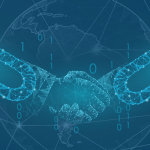#metaverse #crypto #blockchain #DeFi #NFT #DAO
$JPM
“A metaverse is a 3D, immersive, fully-realized digital world, where humans can live a digital 2nd life: working, socializing and building homes and communities” — Paul Ebeling
JPMorgan (NYSE:JPM) is the largest bank in the U.S and it has just said it has become the 1st lender to arrive in the metaverse, having opened a lounge in Decentraland, a virtual world based on blockchain technology.
As well as the unveiling of the Onyx lounge, the name refers to the bank’s suite of permissioned Ethereum-based services, JPMorgan also released a paper exploring how businesses can find opportunities in the metaverse.
“There is a lot of client interest to learn more about the metaverse,” JPMorgan’s head of crypto and the metaverse, said in an e-Mail. “We put together our white paper to help clients cut through the noise and highlight what the current reality is, and what needs to be built next in technology, commercial infrastructure, privacy/identity and workforce, in order to maximize the full potential of our lives in the metaverse.”
With the mainstream acceptance non-fungible tokens (NFT), the past year has seen a breathless advance into the metaverse, a catch-all for immersive gaming, world-building and entertainment, fueled by integrated commerce applications. In January, electronics giant Samsung opened a version of its New York store in Decentraland, and in November Barbados established a metaverse embassy, also in Decentraland.
JPMorgan begins its assessment of “metanomics” by pointing out that the average price of a parcel of virtual land 2X’d in 2-H of Y 2021, jumping from $6,000 in June to $12,000 by December across the 4 main Web 3 metaverse sites: Decentraland, The Sandbox, Somnium Space and Cryptovoxels.
“In time, the virtual real estate market could start seeing services much like in the physical world, including credit, mortgages and rental agreements,” said the JPMorgan e-Mail. It added that decentralized finance (DeFi) collateral management could well come into play, and that rather than traditional finance companies this could be done by decentralized autonomous organizations (DAO) like Knightsbridge.
“We believe the existing virtual gaming landscape (each virtual world with its own population, GDP, in-game currency and digital assets) has elements that parallel the existing global economy,” according to the bank. “This is where our long-standing core competencies in cross-border payments, foreign exchange, financial assets creation, trading and safekeeping, in addition to our at-scale consumer foothold, can play a major role in the metaverse.”
Have a prosperous day, Keep the Faith!









